Years ago, when starting as a serious writer, I went to what everyone does for advice in our age – the internet. There’s a lot of it out there, because everyone is willing to tell you what to do (hell, I’m doing it right now), so I amassed a fairly comprehensive collection of posts and links on the topic of being a writer. The advice I got was fairly universal across the board. There were a few outliers here or there, but for the most part they all said variations of the same exact thing over and over.
“Every writer in today’s world has to sell themselves above all else.”
It used to be that publishers did the advertising and writers generated content. But in today’s world the publisher generally doesn’t do as much advertising anymore – they just print and distribute. That’s one of the primary reasons self-publishing is taking off and why eBooks have started to become the forefront of the market. Writers who could generate their own audiences figure they shouldn’t have to use a middle man. It’s far from a perfect system, but if we’re going to advertise ourselves anyway, we might as well get what we’re worth. So I was told I needed to start advertising for myself because that was going to be a requirement no matter what I did. Publisher or not, I was mostly on my own.
I was told I needed to start a blog, so I did. I was told I needed to get involved in social media, so I did. I was told I needed to make sure that the audience knew who I was, so I do. And the thing is, that’s all great advice. Even if you were to go the traditional route, as I just mentioned, you aren’t going to get a publishing deal unless you can show the publisher that you can amass an audience, and it’s always an uphill battle. But one mistake I’m seeing a lot lately is one I made myself, so I think it couldn’t hurt to add one more piece of advice on top of the pile that I think could really help a lot of writers out there (including myself).
You see, when I started my blog and everything else, it was during the initial rise of social media. And when I was told to tell everyone who I was, I looked around and I saw that everyone was interested in the same basic information. We live in a time where Identity politics consume almost every corner of our lives in one way or another. Since the advent of Twitter, Tumblr, and to a lesser extent Facebook – your “identity” is often broken down into a series of labels that tell the world who you are at a glance.
Look around, most of the profiles you find on the internet, even for writers, happen to include at least one identity label of some sort in it. We’ll generally say what genre we write, what we’ve published, and then, usually, some labels to fill in our identity in under 140 characters. They aren’t always the same labels, but they’re labels none-the-less. We’ve been groomed to think that our lives can be boiled down to five words or less.
But, after putting myself under a tremendous amount of stress over the concept for a few years now, I have realized that we may be causing ourselves and what we care about more harm than good…
Losing My Labels
My blog, and most of my serious work now, have all been written in the time since identity politics became the hot button issue on the internet. I started in the early phases of this current era, when social media was really just starting to rev up and build their user bases, and I got caught up in all of the noise buzzing around those places. It was hard not to get caught up in it: I was told that everyone needed to know exactly who I was and so I looked out over the internet, saw how everyone was telling each other that, and desperately started to seek out my labels.
The problem was, and it’s something I’m finally getting through my thick skull, people are not labels, our work is not made of labels. We are complex, all of us. We are shades of grey, and thankfully not the 50 shades found in those awful books. We are made up of thousands of shades that, in turn, form a complex image. This was a lesson I learned hard and painfully slow, and is best exemplified in one label in particular, because it’s the one I changed thinking that I was making a smart decision.
Since early in my life I considered myself a feminist. I felt that women deserved every right men do and vice-versa. I was told what the movement meant as a child and instantly believed that’s how the world should work. But come the internet and I almost as rapidly found myself constantly at odds with people over that concept. This is strange because most of us believe in the same damn thing.
It’s interesting, actually, that when you look it up you find that only 20% of people in the US identify as “feminists” but over 80% believe in equality between the genders. So I knew, because of those numbers, that a great deal of people believed in the same basic concept that I did. But, as I got bogged down in those conversations, I realized just how many people who identified as feminists were of a kind that didn’t quite mesh with my own beliefs. More than that, I kept finding people on both sides of the issue kept identifying me as something they called an… “asshole”?
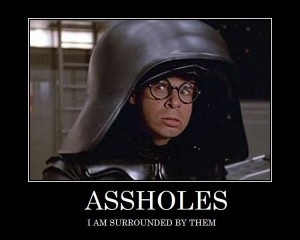
When I would crack a joke, someone would take it out of context. When I made a moderate statement, people would say I wasn’t being “helpful” to the conversation. When I tried to find some reasonable response to someone who identified themselves as an MRA or the like, I was told I shouldn’t even be talking to these people. And the thing is, usually the MRA in question would also call me an asshole for my efforts from the other direction.
In fact, if I were to go back through every profile I’ve ever had and looked up the number of times someone has called me an asshole on the internet, it would probably outweigh the number of copies I’ve sold of each of my books ($2.99 at all major online retailers). Seeing as I don’t consider myself an asshole and that I tend to love everyone I believe to be an honest player – this obviously meant I just wasn’t properly identifying myself to people.
So, of course, I needed more labels before returning to the breach.
This led me down a dark, dark road where I started to look for all the different words that had to be added to the original label. Because, as someone who was trying to promote equality for everyone, I was finding a surprisingly small number of people who actually saw that as what I was trying to do. And after a great deal soul searching and fighting with a progressively larger and larger pile of labels, I thought I finally found a solution.
It was sometime last year when I realized that the word I’d been searching for the whole time, the one that meant exactly what I believed, was “Egalitarian”. You see, as an egalitarian, I could speak on behalf of equality for all people of all walks of life. An egalitarian society is a society of equals, regardless of race, creed, nationality or gender. An egalitarian society would be a society where all people could come together, be happy, and not be oppressed, hated, or feared. An egalitarian is someone who wants everyone, everywhere, to have the same opportunity to be happy and successful.
This was my perfect label, a real keeper.
So I adopted it, I stopped referring to myself with all of the other labels I had and started to just use that one. It worked for everything. Race relations? I’m an egalitarian. Gay marriage? I’m an egalitarian. Gender issues? I’m an egalitarian! I kept this label proudly for the better part of a year and I liked it. And you know what happened?
Someone called me an asshole. In fact, they identified people like me as the greatest of assholes.
It was an article I read a couple weeks ago that talked about the major debates on the internet and the kind of people who they decided just weren’t helpful to the conversation. It listed a lot of different varieties of people I encountered, but the thing that really threw me was when I found the greatest offender on the list and found it was… people like me.
And you know what really blew my mind? They said that the reason why was because anyone who called themselves an egalitarian was “only concerned about labels”.
I’m sorry, excuse me? Have you seen the internet lately? There are people out there, today, who will honestly and legitimately lose their shit on you if you use the wrong pronouns when communicating with their “headmate” the “tortoise-kin” – and god I wish I’d made that sentence up but I’ve actually seen them for myself. To have someone, anyone, in today’s climate turn around and point at people like me who refer to themselves as an egalitarian and say that we are the only ones concerned with labels in today’s climate? It made me realize something I should have realized years ago.
It’s true, as a writer, you need to make everyone understand who you are. But the problem with today’s environment of labels is that we’ve misidentified what the labels are for. The social climate that generated these labels, most of them, was one that professes to have created these labels in the interests of inclusion. But that’s not the truth. Don’t get me wrong, everyone believes that’s the case. But the truth is a far more simple concept:
We adopt labels so we know who to call an asshole without having to listen to them first.
And you know what I realized next? The labels that I had tried to find meaning in for all that time were never going to express the correct information because they didn’t really mean anything. A lifetime is never broken down into five words or less. A lifetime cannot be expressed in 140 characters. Ernest Hemingway devoted his life to beginning with one true sentence and then expanding from there. His work never ended at that sentence, it was just the beginning. And yet, despite knowing this, there are writers today, like myself, who don’t realize that a single word isn’t enough. I had been telling people (and myself in the process) what I am, but not who I am.
And I think a lot of you are doing the same. I know a lot of you are doing the same. Those of us who are writers need to start identifying ourselves with only one label as much as possible: writer. But those of us who are writers, and required to seek attention, should realize that we need to rely on something else. We have to let our work speak for us as much as possible and we have to rise above the climate of the day. There are people out there that we need to win over, yes, but we won’t win them over with those labels unless that’s all our work is meant to be.
Do you run from social commentary? No. You have to still speak of what’s important to you and take a stand. But I think that we, as writers, need to do our best to express those ideas in fully formed fashion rather than labels we apply to our profiles or add to our conversations. Let your blog speak of your ideas. Let your work speak of your ideas. And if someone’s to call you an asshole, let that be because of something you said instead of something they assumed.
A lot of creative people are getting bogged down in these conversations now as they establish themselves with labels. Some have been forced to defend their positions more than they actually work. And, in the end, we still aren’t telling them who we are, we’re just giving them a label to call us an asshole again. We adopt these terms with the best of intentions, but in the end we’re just trying to please everyone.
So that’s the piece of advice I add on top of the pile for everyone else: Let people know who you are and stop getting caught up in what you are. Because hoping your labels will please someone and make them follow you or what you do…
That’s just a dream.
(I write books, give them a look. And also take some time to check out my twitter account, where I do my best to write one true sentence at a time.)


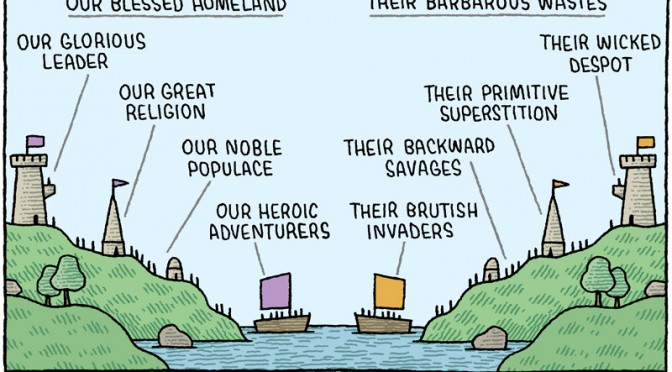
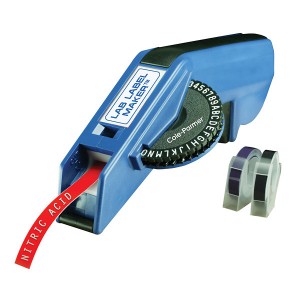
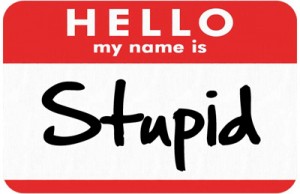

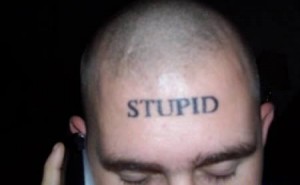

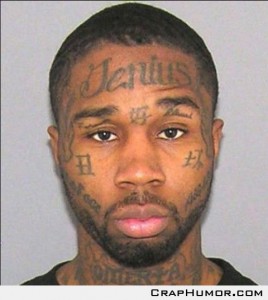
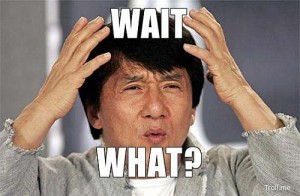
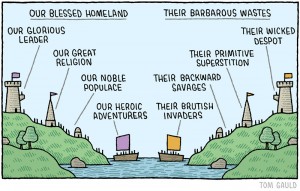





what is the correlation the work with it?
Thanks for the article